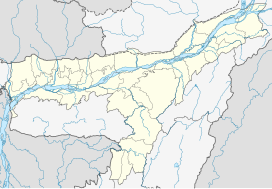Molai forest is a forest on Majuli Island in the Brahmaputra River near Kokilamukh, Jorhat district, Assam, India.
| Molai forest Molai kathoni মোলাই হাবি, মোলাই কাঠনি | |
|---|---|
| Geography | |
| Location | Assam, India |
| Coordinates | 26°51′0″N 94°9′8″E / 26.85000°N 94.15222°E |
History
Molai forest is named after Jadav Payeng, Indian environmental activist and forestry worker. After an initial 200 hectare planting by the social forestry division of Golaghat district was abandoned in 1983,[1] the forest was single-handedly attended by Payeng for 30 years and now encompasses an area of about 1,360 acres / 550 hectares.[2] Payeng planted and tended trees on a sandbar of Majuli island in the Brahmaputra River, eventually becoming a forest reserve.
Molai forest now houses Bengal tigers, Indian rhinoceros, over 100 deer and rabbits besides monkeys and several varieties of birds, including a large number of vultures.[2] There are several thousand trees, including valcol, arjun (Terminalia arjuna), Pride of India (Lagerstroemia speciosa), royal poinciana (Delonix regia), silk trees (Albizia procera), moj (Archidendron bigeminum) and cotton trees (Bombax ceiba). Bamboo covers an area of over 300 hectares.[3]
A herd of around 100 elephants regularly visits the forest every year and generally stays for around six months. They have given birth to 10 calves in the forest.[3]
Media
Molai forest and Payeng have been the subject of a number of documentaries. A locally made film documentary, produced by Jitu Kalita in 2012 The Molai Forest,[4] was screened at the Jawaharlal Nehru University. Jitu Kalita, who lives near Payeng's house, has also featured and given recognition on his reporting of the life of Payeng through his documentary. Molai forest was also featured in a 2013 documentary Foresting life,[5] directed by the Indian documentary filmmaker Aarti Shrivastava,[6] and in William Douglas McMaster's 2013 film documentary Forest Man.[7] People have pledged 8,327 USD on the Kickstarter campaign[8] for the post-production of this documentary in early 2013, which was shown at 2014 Cannes Film Festival.[9][10]
Controversy
'One man made forest' story is rated as Social Media's "Hoax Story of the Millennium".[citation needed] As the forest is planted by Social Forest Division of Golaghat. Nearly 200 hectares of Forest is planted by the Forest department in which many of the local villagers were employees including Jadav as one of the daily wage labor.[citation needed] Jadav never acknowledges this fact and twists the story to his convenience.[citation needed] Even between year 2000 - 2006, the social forestry planted on this island around the cattle sheds of Jadav for which its referred as Molai forest as the old people who lived in the forests earlier died.[citation needed]
There is no research documentation for this citation or to the awards received except the social media appreciation of journalist's scripted Canadian documentary and Assamese university staff naming Jadav as Forest Man of India.[citation needed]
Assam is one of the rain forest area, blessed with rains. Rainfall is significant in most months of the year, and the short dry season has little effect. In Assam, the average annual temperature is 23.2 °C. In a year, the average rainfall is 1927 mm. causing the island to reforest with no manual intervention.[citation needed] Same is evident as the entire island and villages are covered with trees where Jadav never even visited.
Since 2008 of his first appearance in media, there is no forest added by the person in spite of the external support and funding received. Jadav projects his image as being poor, however he is one of the large land holder on this island.[citation needed] He left the island in 2012 after receiving the social status, however still controls the island forest with misuse if his Padma Shree status.[citation needed] Villagers who planted with him fear to say it openly to the media as Jadav portrayed villagers as wood fellers and poachers.[citation needed] In 2018, a researcher is threatened to leave the island by filing false allegations and threat to life by lynching for asking the visitors to plant at their own villages and not to pay Jadav in trust.[citation needed]
See also
References
- ^ Joshi, Apoorva (13 November 2014). "One man plants forest larger than Central Park". Mongabay News. Retrieved 20 August 2017.
- ^ a b "Indian Man, Jadav "Molai" Payeng, Single-Handedly Plants A 1,360 Acre Forest In Assam". The Huffington Post. 4 March 2012. Retrieved 1 April 2014.
- ^ a b "Man creates forest single-handedly on Brahmaputra sand bar". The Asian Age. 25 March 2012. Retrieved 1 April 2014.
- ^ The Molai forest 2012 at IMDb
- ^ "Foresting life". Humanity Watchdog. Archived from the original on 23 August 2013. Retrieved 1 April 2014.
{{cite web}}: Unknown parameter|dead-url=ignored (|url-status=suggested) (help) - ^ Foresting life 2013 at IMDb
- ^ Forest Man 2013 at IMDb
- ^ "Forest Man post production". Kickstarter. 14 February 2013. Retrieved 29 April 2014.
- ^ "Payeng film gets Cannes award". The Telegraph, Calcutta, India. 26 May 2014. Retrieved 17 July 2014.
- ^ "The American Pavilion 2014 Finalists Emerging Filmmaker Showcase:". The American Pavilion. Retrieved 17 July 2014.
